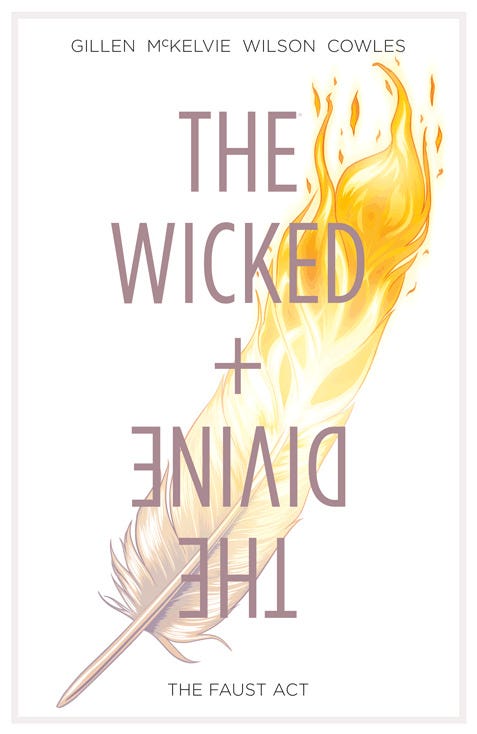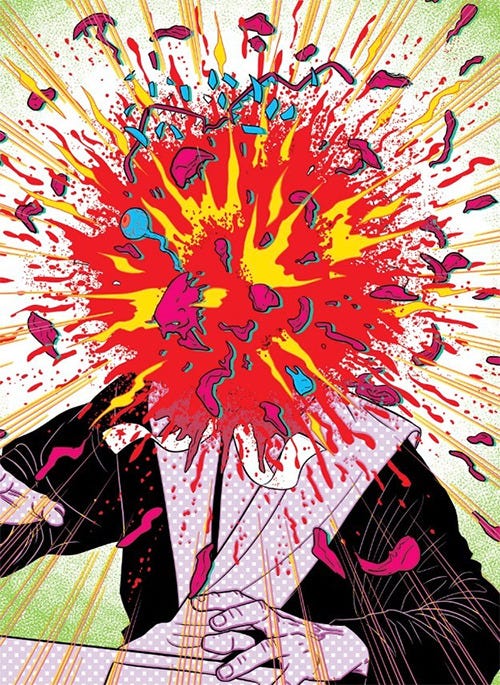Warren Peace Classic: The Wicked + The Divine, by Kieron Gillen and Jamie McKelvie
My ambivalence toward Kieron Gillen stretches back a ways.
Since I recently published a review of a comic by Kieron Gillen, I figured this
would be a good chance to share a couple things I wrote about another popular series of his back in 2015. This was from a time when I was experimenting with Tumblr, before I gave up on it because I decided I was too old to understand how to use the platform, even back then.
The Wicked and the Divine, by Kieron Gillen and Jamie McKelvie: Call me dense (go ahead, it's probably true), but I'm not sure I get this comic. Its premise is that every 90 years, 12 gods appear on earth in human form, live for two years, and then they all die (if they haven't already). We get a brief flashback to the final moments of the last few gods from their 1920s tour, and then we see them showing up in 2014. I'm not sure what happened last time, but this time they seem to be pop stars that gain a large fanbase of Millenials. The main character is a fangirl who ends up getting involved in godly affairs, and there's intrigue involving squabbles among the gods and some of the gods messing with humans, which I guess they aren't supposed to do?
My main issue here is that I'm not sure what these gods are supposed to represent. They're pulled from various religions across the globe (Amaterasu is Japanese, Woden is Anglo-Saxon/German, Sakhmet is Egyptian, Baal is Middle-Eastern, and Lucifer is Christian/Roman Catholic, maybe?), but they all hang out around London and look like attractive British young people. They're basically superheroes, which makes me wonder if this is supposed to be a take on the tiresome idea that pops up every so often of superheroes as the modern version of mythology.
The thing is, gods aren't just higher-dimensional people with cool powers, they're stories that people came up with when they didn't have a full understanding of the natural universe and needed to come up with an explanation for the awe-inspiring things that happened around them, like lightning crashing in the sky, the perpetual motion of the ocean's waves, the life-giving heat of the sun, the omnipresent spectre of death, or even the sense that capricious luck that can affect our lives beyond our control. Treating gods as just some higher-dimensional beings that show up on earth and fight each other with superpowers removes much of the power of the concept.
Not that stories about gods have to do with belief or humanity reckoning with the unknown or whatever; from Homer to Jack Kirby, people have been telling stories about awesome higher beings for millennia. But when a story is specifically about humans relating to gods (and specific gods taken from religions across the globe and throughout history), it seems like a waste to just treat them as higher-dimensional aliens hanging out on earth.
Of course, my reservations could be answered at some point, since there seem to be secrets that will be revealed at some point in the series' future, with the gods saying that they shouldn't meddle in human affairs (or at least do stuff like kill people in public), as well as some hints that their actions while on earth might affect their "rankings" on the godly plane or whether they are included among the 12 selected gods that show up on earth the next time around. Maybe this will all go in the direction of how gods are often treated in fantasy, where their powers rely on how much humans actually believe in them. That might play into the celebrity angle that gets touched on here. I dunno.
But whatever the case, while maybe everything will fall into place by the end of the story, at this point it feels kind of empty, an exercise in cool that borrows resonance from concepts that have intrigued humanity for much of our shared history. It would be nice if it eventually has something interesting to say, but I'm not really expecting that it will. Still, it's interesting enough, and there's enough there to get me thinking, so it should be worth following to see how it all turns out.
A word about the art on The Wicked and the Divine: I want to like McKelvie's art, but there's just something about it that has never quite worked for me. I do think he's an excellent designer, especially of costumes and characters, but in actual comics storytelling, I find his work stiff and posed, even kind of plastic-looking. Just look at that guy up there, who sports what is supposed to be a petulant sneer but doesn't have an expression that looks all that different from the severed head he's carrying. Or this sort of talking-head scene that fills much of the series, where characters stay in the same poses and slightly alter their expressions throughout their conversations:
But that character design is so striking, it's easy to forget about the storytelling that is often kind of hard to follow (such as a scene in which the Egyptian cat-goddess Sakhmet keeps tackling people because dots from either laser pointers or sniper scopes keep appearing on them, which seems intended to be physical comedy, but ends up being barely comprehensible). The look of the characters is so well done (just check out those great covers), with crazy designs on people's faces, hair that's perfectly coiffed, and out-of-this-world costumes and settings (Woden's motorcycle-helmeted Tron suit and neon-colored headquarters are a standout). And when they actually display their godly powers, it can be pretty awesome, with stuff exploding, walls of fire, and people turning into huge flocks of crows. But my favorite visual is the surprising number of head explosions that take place, which leap off the page with off-register colors and benday dots that make the flying eyeballs and brain matter look like a Lichtenstein painting:
That's pretty nuts, and that sort of chaos is a large part of why I'm interested in sticking around for the next volume1, in hopes of not only getting some answers about the godly drama, but more violence that demonstrates immortal capriciousness through a complete disregard for human life. I'll be on board for that any day, as long as it looks as good as this.
In the voice of the narrator from Arrested Development: “He did not stick around for the next volume.”







